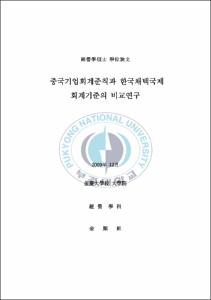중국기업회계준칙과 한국채택국제회계기준의 비교연구
- Abstract
- A Comparative Study between
Chinese Accounting Standards and Korean IFRS
Jin, Shunji
Departmet of Business Administration
Graduate School
Pukong National University
Abstract
The objective of this paper is to analyze the difference between current Chinese Accounting Standards announced in 2006 (hereafter, current-CAS) and the International Financial Reporting Standards (IFRS) adopted by Korea in 2008 (hereafter, K-IFRS) as a benchmark of the IFRS. By comparing the two standards (current-CAS and K-IFRS), the paper is to identify the differences and causes of differences and suggest the ways to improve the current-CAS in near future.
The current Chinese Accounting Standards prepared by Chinese government, has been announced on February 15, 2006 by reflecting a large (but not all) portion of IFRS principles. Chinese government enforced for the listed firms in the Chinese stock market to mandatory follow the current-CAS from January 1, 2007 and for the unlisted firms to voluntary follow the current-CAS. Whereas, Korea government adopts nearly all of the IFRS's principles and enforces for the listed firms in the Korean stock market to mandatory follow the K-IFRS from January 1, 2011.
The results of the paper show that the difference between the current-CAS and K-IFRS are as follows:
Firstly, the current-CAS does not adopt yet four specific standards while the K-IFRS adopts those four specific standards in IFRS such as IFRS No. 5 (Non-current assets held for sale and discontinued operations), No. 8 (Operating segments), No 29 (Financial reporting in hyper-inflationary economies), No. 33 (Earnings per share).
Secondly, the current-CAS does not accept consolidation accounting yet whereas the K-IFRS accepts consolidation accounting.
Thirdly, the current-CAS does not accept comprehensive income concept in the income statement yet whereas the K-IFRS does accept comprehensive income concept already.
The causes of the above differences result from several factors related to politics, economics, and social environments surrounded two countries where the socio-economic background of China is based on socialism for the last six decades while that of Korea is based on capitalism for the last five decades. The other causes arise from economic growth patterns of the countries. Even if the economic growth pattern in China is very fast for the last two decades, the market for mergers and acquisitions is not active to enforce consolidation accounting for the listed firms.
- Issued Date
- 2010
- Awarded Date
- 2010. 2
- Type
- Dissertation
- Publisher
- 부경대학교
- Department
- 대학원 경영학과
- Advisor
- 김태용
- Table Of Contents
- 목 차
Abstract ⅳ
제 1 장 서론 1
제 1 절 연구의 필요성 1
제 2 절 연구의 목적 3
제 3 절 연구 방법 및 구성 4
제 2 장 중국기업회계준칙의 변천과 주요내용 7
제 1 절 현행중국회계법체계의 구성 7
제 2 절 중국기업회계준칙의 변천과정 14
제 3 절 중국기업회계준칙의 특징 19
제 3 장 한국채택국제회계기준의 변천과 주요내용 25
제 1 절 한국기업회계기준의 변천과정 25
제 2 절 한국채택국제회계기준의 도입 32
제 3 절 한국채택국제회계기준의 특징 37
제 4 장 중국기업회계준칙과 한국채택국제회계기준의 비교 47
제 1 절 국제회계기준의 중국ㆍ한국회계기준의 수용정도 비교 47
제 2 절 중국과 한국의 회계기준의 비교 50
제 3 절 중국과 한국의 회계기준 차이의 원인 67
제 5 장 결론 72
부록 77
참고문헌 80
- Degree
- Master
- Files in This Item:
-
-
Download
 중국기업회계준칙과 한국채택국제회계기준의 비교연구.pdf
기타 데이터 / 924.02 kB / Adobe PDF
중국기업회계준칙과 한국채택국제회계기준의 비교연구.pdf
기타 데이터 / 924.02 kB / Adobe PDF
-
Items in Repository are protected by copyright, with all rights reserved, unless otherwise indicated.